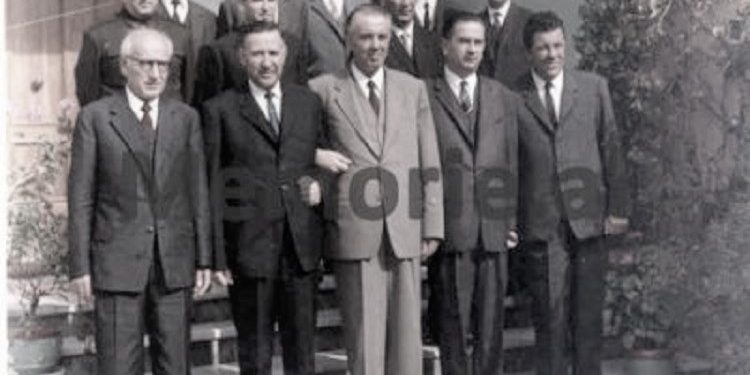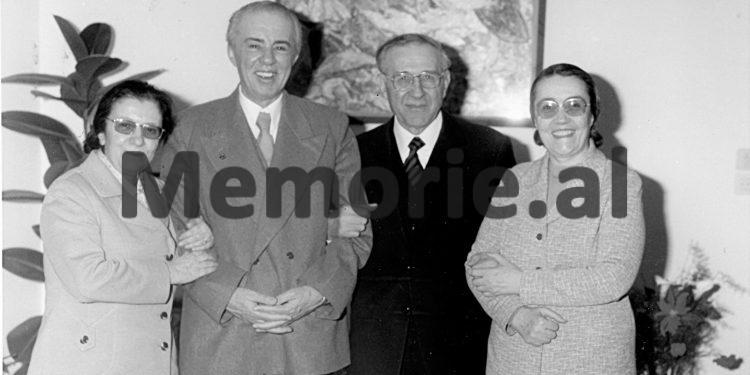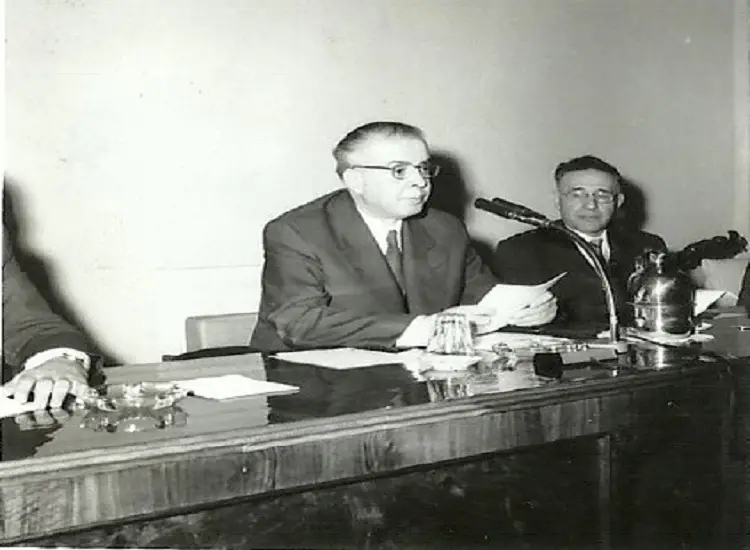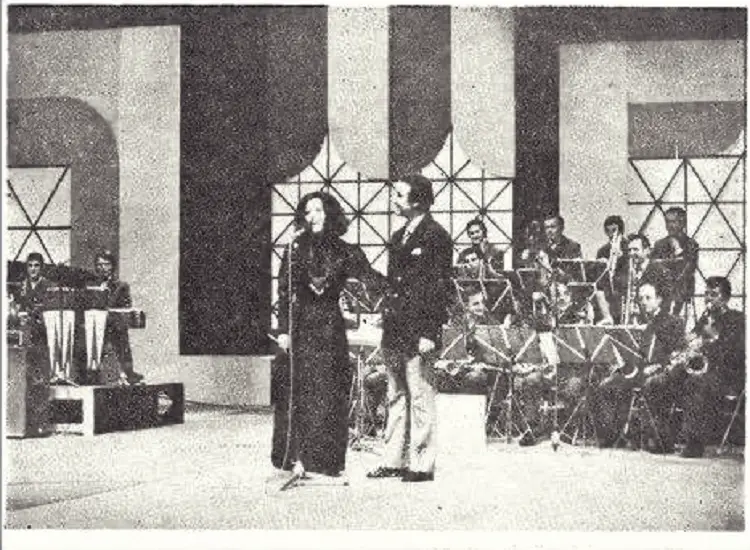Dashnor Kaloçi
Second part
Memorie.al publishes some archival documents extracted from the Central State Archive in Tirana, (the fund of the former Central Committee of the ALP), where the political diary of the General Secretary of the Central Committee of the Labor Party of Albania, Enver Hoxha, for the period 1973-1980, where he kept notes and made analyzes and conclusions about various meetings and conversations he had at that time, mainly with the former Prime Minister Mehmet Shehu, with the secretary of the Central Committee of the PPSh , Hysni Kapon, with the deputy prime minister and member of the Political Bureau, Spiro Koleka, etc., with whom he has discussed issues of Albania’s foreign policy and mainly relations with the People’s Republic of China, as well as the influence it had in the international arena, etc.. But in addition to these, also with the reports and relations of the official Tirana, with a number of other countries of the Communist East and the West, mainly in trade relations, such as: Yugoslavia, Poland, Czechosl Slovakia, Soviet Union, Greece, Austria, Sweden, Italy, France, Switzerland, West Germany, Canada, etc.
In the archival documents in question, where his political diary is located, Enver Hoxha also took note of some conversations he had with Mehmet Shehu, such as the one on July 15, 1973, who suggested that they take some steps in politics foreign affairs, holding talks first with France, Switzerland or any Scandinavian country, which Enver did not approve, saying that he was looking forward to the USA, the Soviet Union, etc. Regarding this, in his political diary, among other things, he writes: “I was in our club with Mehmet Shehu and Spiro Koleka. Talking about the development of events in the world, Mehmeti expressed his opinion: ‘If we get official contacts for political talks, to present our views, first with France, then with Switzerland and with some Scandinavian countries, etc. This should be done by sending our Minister of Foreign Affairs and they should mutually send theirs’.
He finds this moment reasonable due to the fact that France is currently dissatisfied with the Brezhnev-Pompidu agreements. I did not support this proposal, because we do not win anything, we only lose in the international arena, and I explained why. It is true that in these conjunctures, France is unhappy and tries to split, and we must help to deepen these contradictions”. Regarding this, as well as the other notes that Enver Hoxha kept in the political diary belonging to the period July 1973 – July 1980, mainly the conversations he had with former Prime Minister Mehmet Shehu, such as those about the Italian engineer who lived in Milan and was contacted by a group of specialists from the Ministry of Industry, as he claimed to have an apparatus for the discovery of oil, negotiations with West Germany, for the payment of war reparations, for which he (Enveri) had shown great displeasure for the procrastination of them and the majesty of the Minister of Foreign Affairs, Nesti Nase, (who according to him was sleeping), until Enver’s clash with Mehmet, over the book ‘Khrushovians’ that Hoxha had prepared for publication in 1980 and gave them to read made a remark, some of the friends of the Political Bureau, etc.
Continues from last issue
Archival document with the political diary of Enver Hoxha in the period 1973-1980
DURRES, THURSDAY 13 JULY 1978
IN FOREIGN TRADE RELATIONS THE GREAT AUTHORITY OF OUR PARTY AND STATE SHOULD NOT BE VIOLATED IN ANY WAY
Mehmet Shehu told me that tomorrow, July 14, he will have Ernst Austin, chairman of the Communist Party of Germany (Marxist-Leninist), for lunch. Among other things, he told me that he was thinking of proposing to Aust that his party recommend or connect us with various West German merchants to trade and exchange goods.
I told him not to do such a thing, firstly because it is not appropriate for the prime minister to make such a proposal to the leader of a sister party.
Secondly, there is the issue that we should not follow the practice followed by the revisionist Communist Party of the Soviet Union, which, through the French, Italian Communist Party, etc., linked up with capitalist firms and left them a percentage of the contracts that were made.
We consider the Communist Party of Germany (Marxist-Leninist) and any other Marxist-Leninist party as a political, ideological, revolutionary, fighting partner, so we should not think at all that with them, they will try to find us as thieves of our goods.
We have to do this work through our commercial attachés that we have abroad. The sister Marxist-Leninist parties are loaded to the brim with great difficulties and at war with the fiercest reaction; they find themselves facing an enemy that must be fought.
Therefore, we should not in any way drag them into such a preoccupation. Friends of the sister parties May not reject this proposal, but they may also tell us that it cannot be done.
In connection with trade matters, I again emphasized that the Government should not be hastened by demands and offers from all capitalist and revisionist countries for industrial facilities, which we will need, either to successfully complete the present plan or the plan next.
We, of course, do not take and never will take loans from these countries, everything will be bought in them with cash, clearing or foreign exchange, but we must bear in mind that in these times we are going through, in this period when the open war with China has started, every reckless step on our part will be used by Chinese and pro-Chinese propaganda as if we are connecting either with the West or with Moscow.
We do not do such a thing, of course, but I told him that the reaction burdens even the male ass, even now that he has started to say and expect from which direction Albania will be directed, from the West, or will it go towards the East.
With our positions in foreign relations, we must make it clear to the West, the East and the Far East that the positions of the People’s Socialist Republic of Albania do not change, that it is at war with imperialism, with social-imperialism and with all the reactionary bourgeoisie, that it will trade with different countries and this trade must be measured, as always balanced.
In our foreign trade, for the contracting of some economic objects, we should, of course, prefer those states which do not have pronounced imperialist expansionist tendencies. For example, we may prefer to contract a power plant or a turbine for foreign exchange, cash, or clearing in Austria, Czechoslovakia, or some other small country, but never the less West Germany, France, or in Scandinavian countries.
We will do this not only for the reasons I said, but also because in these countries I mentioned (in the direction of which Mehmet Shehu had a tendency that we can tax them), they have very expensive goods and in fact he himself, he told me that the prices there are almost twice as much.
Therefore, even from this side, we are not interested in contracting with these countries, especially with the big imperialist countries, such as West Germany, France, etc. We could contract machinery and equipment with Switzerland, but if its goods were cheap. But in Switzerland they are very expensive.
We can do something with Italy, we can also do something with Austria, but we must also trade with revisionist countries, such as Czechoslovakia and Poland, with which we have not cut off trade relations. We have severed state relations with them in the direction of embassies and, although we have continued the political-ideological war with them, we have not severed trade ties, nor have they severed them with us, and this trade has continued to develop with regular rhythms.
Therefore, the purchase in Czechoslovakia of one or two turbines, or of any other machinery or apparatus that we will need for our industry, is not something extraordinary. Such a thing cannot be used for propaganda and slander against us.
Also, we should also try from the side of Greece, that is, we can contract something with it too, if there is an opportunity there. We must continue the trade with Yugoslavia in the way that the common interests and the political interests that we have with it or with other countries of different continents, but which do not have the character of imperialist countries, which seek to throw their claws in Albania, beg. .
We should have very, very limited relations with such countries, despite the fact that the prices may be somewhat lower. We prefer a price that is even a bit more expensive, than to receive them from such countries that are known in the world as countries that develop neo-colonialism and that trade with tendencies of economic and political invasion.
In the first place, we must take measures to build those industrial facilities that are left in the middle, take measures to develop trade, sell our goods and create adequate funds to meet current needs, but especially the needs of the plan of the next five-year period, which will roughly, if I’m not mistaken, have a demand of 500 million dollars.
We, of course, have great opportunities to use these 500 million dollars for the purchase of factories or power plants that we will need, but we must produce well and we must find a stable market for these products. This should be our economic objective.
In negotiations with abroad, the external political moment of our country should not be forgotten for a minute. In no way should we act hastily in order to undermine the great authority of our Party and the People’s Socialist Republic of Albania, therefore in no case should we be in a hurry, but proceed cautiously, and accomplish everything, but carefully.
This issue is important because, as Mehmet Shehu reported to me, they have sent a large number of groups of people abroad to the four corners to see. This can be done, but we should not give the impression that now, look, we are sending people from all four sides.
We are criticizing China for such a thing, so let’s send groups of people, where it is necessary and how much it is necessary, so very carefully. Then we don’t have to send them to see a technology that we know, like bituminous technology, so there’s no need to send a bunch of people from our side all the way to Canada.
Our friends who are engaged in this work have decided to send, and let them send, but while we are at present working the tar sands, we have no great immediate interest to act upon us, and which we cannot do without going there to see .
Canada may have large plants for this matter, but ours here are small, and we have begun to build them and use the tar sands with them, so let us send out teams, but let us send them wisely, where necessary and for problems that are absolutely necessary.
FRIDAY MARCH 2, 1979
WITH ITALIAN IN EVERY DIRECTION, YOU MUST WALK CAREFULLY
Mehmet Shehu told me that the Ministry of Industry and Mines, of course with the approval of the Prime Minister, has approved that an Italian oil engineer, residing in Milan, come to Albania, who is considered a friend of our country.
There, in Milan, a number of our specialists have gone before, contacted and talked with him. He had an apparatus that he made himself, with which he claims that oil can be detected up to two thousand meters deep. This apparatus, of course, does not belong to him, I think it should belong to AGIP, or to some other large Italian company, companies that have been around since the time of the occupation of our country and have exploited Albania’s oil.
I did not know that such a man had come. Mehmet Shehu told me that our specialists have talked with him and told him that we would like to have an apparatus that would dictate the oil up to four thousand meters deep and he had told them that he would need to for this purpose, make some changes to this apparatus, which he can bring here and try, or our people can fit it in Milan and see how it works.
I told Mehmet Shehu that, since you allowed this man to come to Albania, fine, but be careful in your relations and negotiations with him. We do not and should not enter into an agreement with AGIP, or any other Italian oil company.
But with this person, we have a business relationship and we can buy this device with cash, if it is useful and helps us for what he claims to do. Therefore, in every direction, one must proceed carefully with the representatives of the Italian monopolies, because they have other goals, which we know. Memorie.al
The next issue follows














